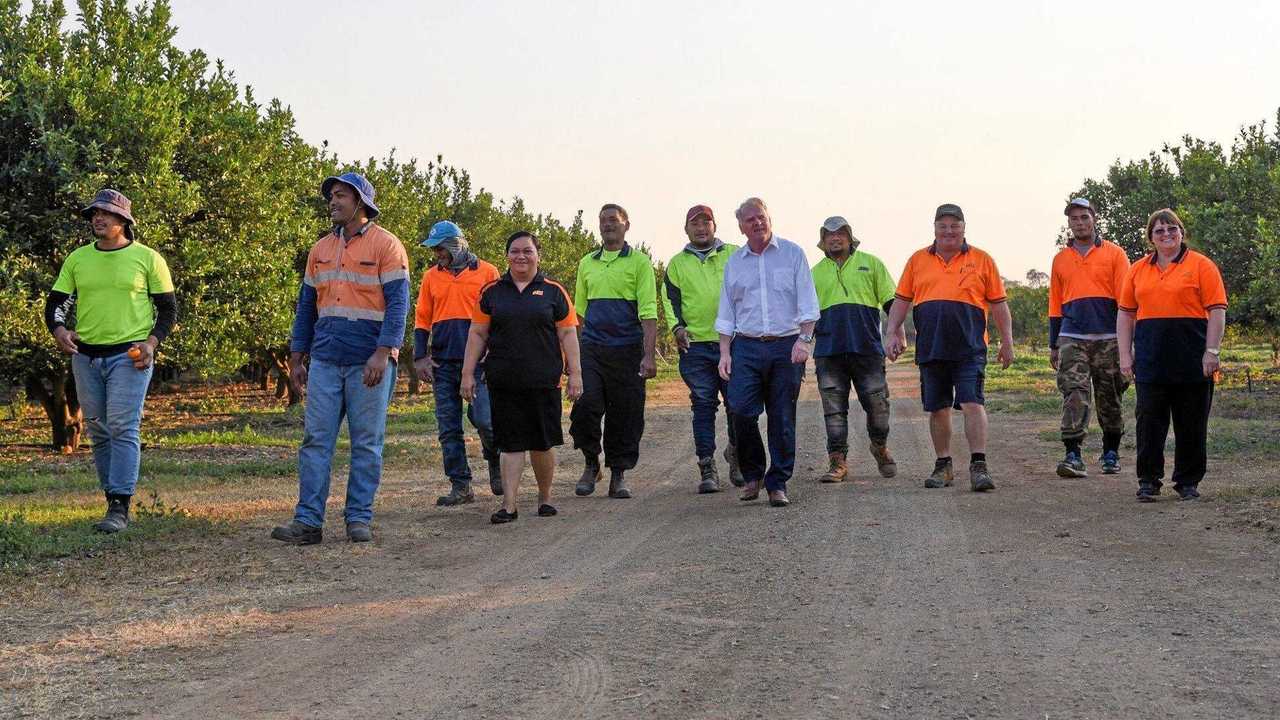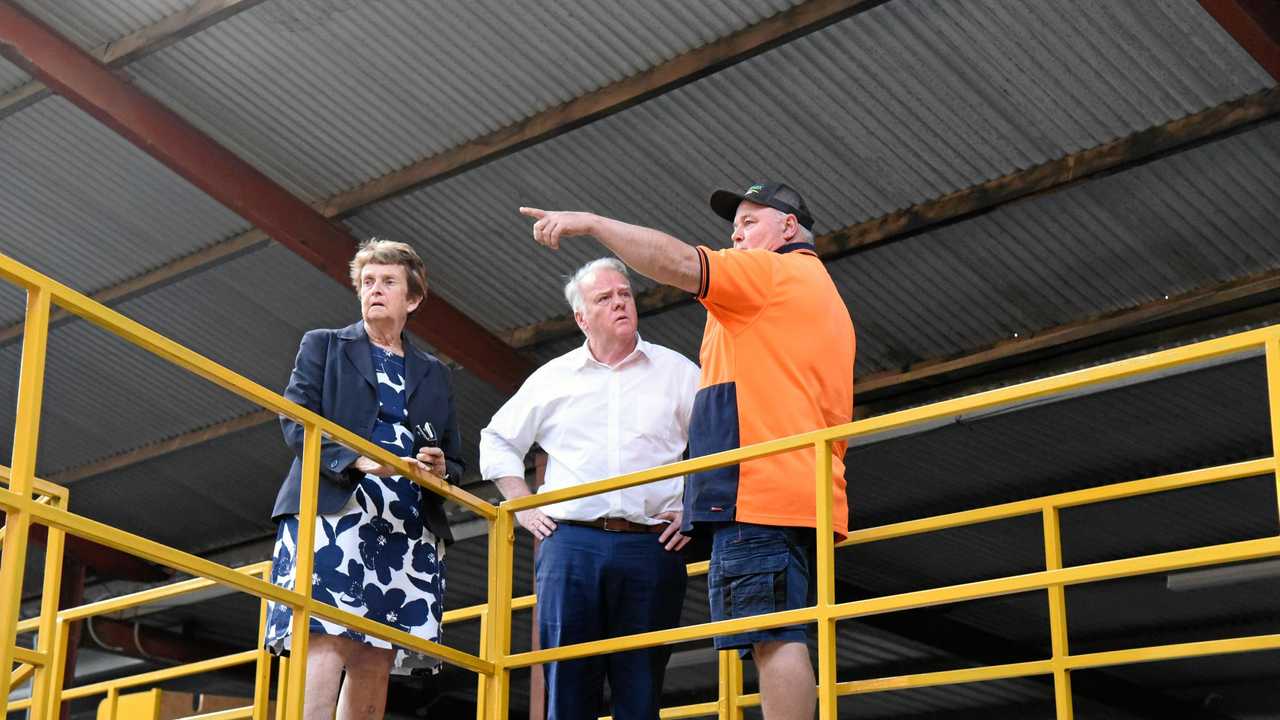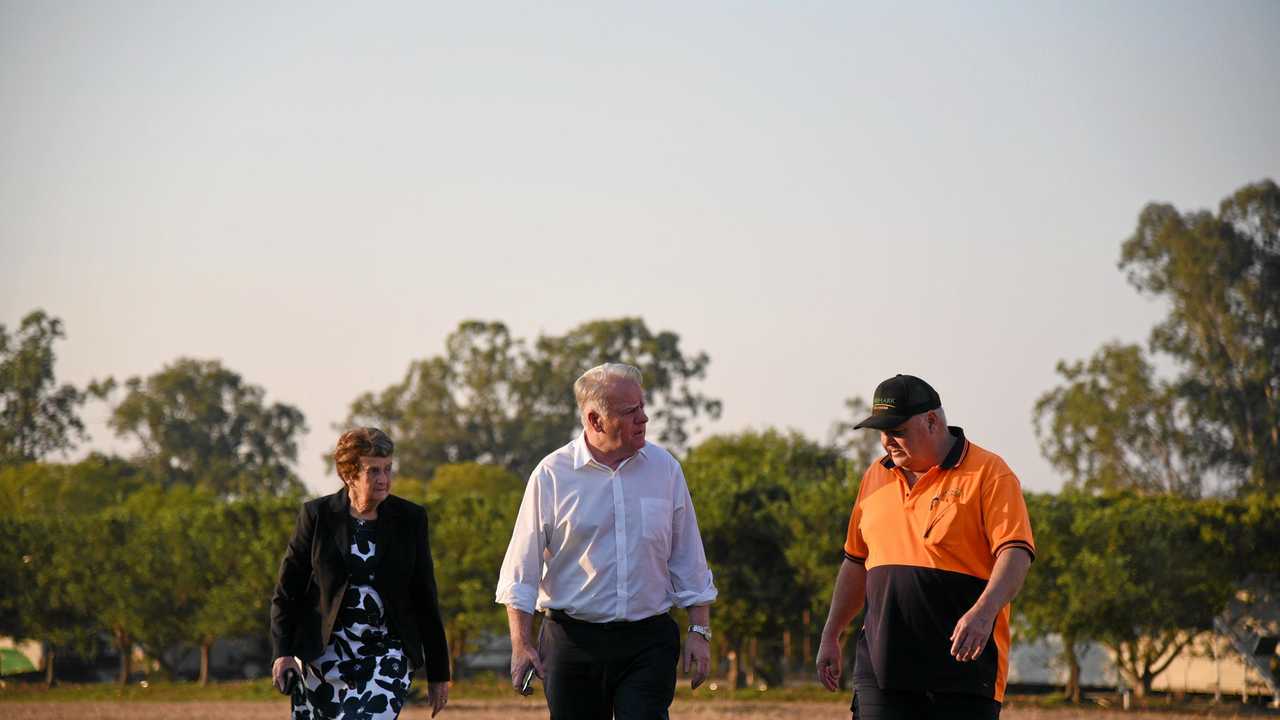What is the high commissioner to Tonga doing in the Burnett?
Seasonal workers have helped transform this town's economy. Citrus producer shares his story while hosting the high commissioner.

Business
Don't miss out on the headlines from Business. Followed categories will be added to My News.
MUNDUBBERA citrus grower Craig Meyer gives a blunt assessment of where his operation would be without the Seasonal Worker Programme.
"I probably wouldn't still be in business if it weren't for this program,” Mr Meyer, owner of 888 Citrus, said.
"They've been a godsend to me.
"It's the best thing I've ever done.”
Before the scheme's introduction in July 2012, Mr Meyer relied solely on backpackers and local workers to help harvest his fruit, which at times led to high employee turnover.
However, after the introduction of the Season Worker Programme, which allowed employers in the horticultural industry to access workers from eight Pacific island nations and Timor-Leste when they could not find enough local labour to satisfy seasonal demand, he was able to stabilise his workforce.
Mr Meyer hires about 52 employees under the scheme each April-September and many of them have returned for several years.
In Mundubbera, and more generally, the scheme is particularly popular with Tongan workers, which is why Australia's High Commissioner to Tonga, Adrian Morrison, chose to visit the North Burnett town on Thursday and Friday.
He was in Canberra for the three-day Department of Foreign Affairs and Trade Global Heads of Mission meeting, which occurs once per parliamentary term.
Ambassadors and high commissioners are encouraged, as part of their visit to Australia, to "get out to the regions”, Mr Morrison said, which was how he ended up in Mundubbera.

Along with touring 888 Citrus, Mr Morrison attended a dinner at Billabong Motor Inn, featuring local Tongan workers, employers and other community groups, and toured the Smart Berries farm, which has just begun hiring Tongan workers under the scheme.
Mr Morrison said Tonga had just been overtaken by Vanuatu as the country providing the most seasonal workers to Australia.
"My observation is that it makes a material difference to families and communities in Tonga,” he said.
Workers use the money earned in Australia to create wealth in Tonga, by using the capital to fund kava farms, whale-watching tours, bed and breakfasts, vehicles for transport operations, and other small businesses, Mr Morrison said.
Mr Meyer said although some workers were paid a piece rate while others are on a wage, and pay varied accordingly, a typical Pacific worker at 888 Citrus could expect to take home $800-$1000 gross per 38-hour week.
One Australian dollar is worth about 1.6 Tongan pa'anga: $1000 equals 1600 pa'anga.
Mr Morrison said police in Tonga could only expect to earn about 7500 pa'anga per year, which illustrated the importance of the scheme to the Tongan economy.
North Burnett Regional Councillor Faye Whelan said she believed, during the height of the picking season, Mundubbera might host as many as 400 Tongan workers.
The town was one of the first to receive workers under the pilot of the program, back in 2009, alongside Robinvale and Mildura in Victoria.
Golden Mile Orchards was the first Mundubbera producer to receive workers, followed by Ironbark Citrus.
According to the Final evaluation of the Pacific Season Worker Pilot Scheme, prepared for the former Department of Education, Employment and Workplace Relations, Mundubbera received 146 of 465 Pacific workers who participated in the pilot, all from Tonga.
Cr Whelan said she believed one of the keys of the program's success in Mundubbera was the pre-existence of about 10 local Tongan families who helped provide pastoral care to the new arrivals.

"The local community embraced the workers and they integrated,” Cr Whelan said.
Mr Meyer said he understood the importance of this care - Vika Tau, who has lived in Mundubbera since 2013, performs this role at 888 Citrus.
Mrs Tau said she helped the workers with translation, medical certificates, tax file numbers, setting up bank accounts and organising church services.
Mrs Tau also convenes a weekly meeting with the Tongan workers to check up on them.
However, it's not only the presence of existing families in Mundubbera which helped smooth the way for the new arrivals.
Rugby league and church proved to be two areas through which the two cultures found a common language.
But the integration wasn't entirely without its growing pains - there were a few "little fires” to put out, Cr Whelan said.
Cr Whelan said North Burnett Regional Council spoke glowingly of the program at the pilot's concluding conference and received a "standing ovation”.
The relationship between Tonga and Mundubbera has deepened in the past few years.
Cr Whelan travelled to Tonga in August 2018 to distribute more than $13,000 worth of aid Mundubbera raised for the island nation in the aftermath of Cyclone Gita, which devastated Tonga in late February.
"The Mundubbera community felt compelled to help in some way because during our time of need, when Mundubbera suffered two large flood events within two years (2011 and 2013), the Tongan workers and residents helped our community groups and essential services evacuate the houses at risk of not only people but furniture,” she told the Times.
She said the most rewarding aspect was seeing "smiles of gratitude” on Tongan faces.
Mr Meyer said he felt a similar way.
"I regularly get sent photos from past seasonal workers, saying, 'Look at what I've bought',” he said.
"It makes you feel pretty good.”
Originally published as What is the high commissioner to Tonga doing in the Burnett?






